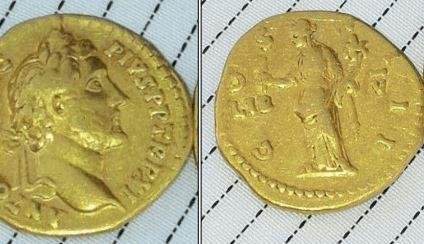A first century B.C. coin is among the artifacts specified in a Justice Department lawsuit against the Islamic State. The complaint in federal court Thursday, the first of its kind, says IS steals and then sells antiquities, and that any item found and seized is subject to forfeiture. Photo courtesy of the U.S. Department of Justice
WASHINGTON, Dec. 15 (UPI) -- The U.S. government filed a lawsuit Thursday seeking the return of antiquities plundered by the Islamic State.
The civil complaint for forfeiture of four artifacts -- a gold ring; a stela, or carved gravestone-like slab; and two gold coins –--of the thousands of art and historic items stolen by the militant group. The Islamic State -- also identified as Daesh, ISIS and ISIL -- then typically sells the items to fund the terrorist group's activities.
The Department of Justice learned about the four missing items during a raid on a home of Islamic State finance leader Abu Sayyaf in 2015. Numerous artifacts were found, which "appeared to have been in the process of being sold internationally.
"For example, the antiquities were cleaned and maintained in a manner consistent with the preparation for sale. Moreover ... Abu Sayyaf's electronic media had multiple photographs of other antiquities. These photographs were staged in a manner consistent with the sale of antiquities."
Among the documents, images of the four items in question were found, and now the U.S. government wants them forfeited.
The unusual step of a lawsuit in a U.S. federal court is an indication that the government intends to direct its attention to black market dealers, legitimate art dealers and collectors in its search for treasure missing from Iraq, Syria and other locations where IS operates. It is the first time that the United States has filed an action to forfeit antiquities that are foreign assets of IS.
The complaint says IS operatives attempted to sell looted antiquities at inflated prices, with excess profits going to fund IS; one document suggested the purchase of artifacts by merchants required a "20 percent extortion fee."
In a press release announcing the lawsuit, the Department of "art and cultural item buyers are recommended to review the FBI's National Stolen Art File prior to a purchase to avoid civil forfeiture of stolen items."
In addition to looting and selling artifacts from locations they take over, the Islamic State has made a practice of destroying historic buildings and sculptures it deems unIslamic.















